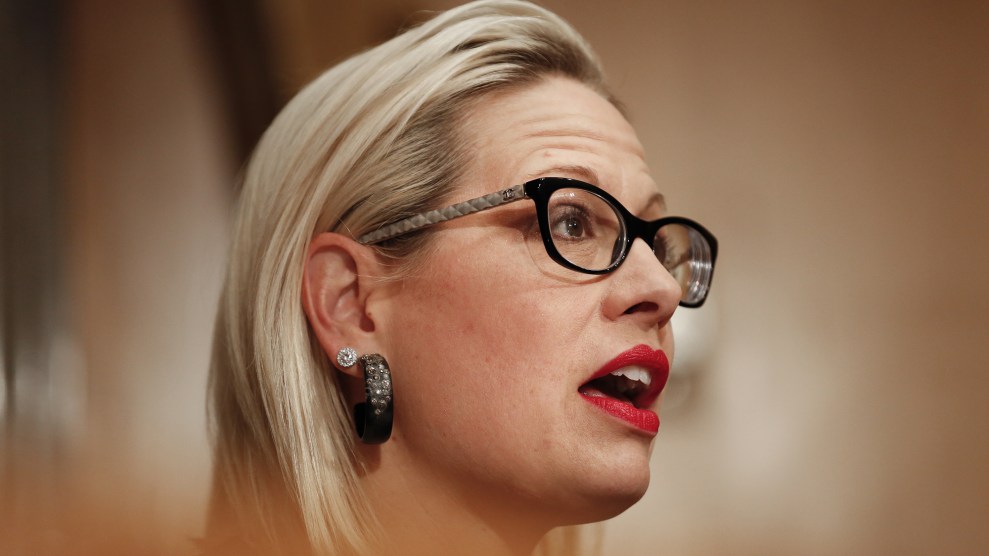
Stefani Reynolds/CNP/Zuma
In a Washington Post op-ed published late Monday night, Kyrsten Sinema offered her most detailed statement yet on why she does not support abolishing or reforming the filibuster—the Senate rule that requires 60 votes to bring a piece of legislation to the floor for a final vote. While acknowledging that some measures she supports, such as the For the People voting-rights package, are almost certain to be filibustered, Sinema argued that the long-term benefits of keeping the supermajority requirements outweigh the drawbacks. “The filibuster compels moderation and helps protect the country from wild swings between opposing policy poles,” she wrote.
Sinema’s stance won’t win her more friends among Democrats in Washington or her home state (where activists protested outside her office on Tuesday). But she drew praise from a source that would have once seemed unusual. In a visit to his old office, the former Connecticut Democrat-turned-independent Sen. Joe Lieberman told reporters that Sinema was right to defend the filibuster, even if he believed it was a fight she’d lose in the end.
Few moments illustrate so perfectly the personal and political evolution of Arizona’s junior senator. When Sinema was first becoming active in state politics as a lefty political activist—she ran as a Green Party member and as an independent before finally joining the Democratic fold—she viewed Lieberman as the embodiment of Washington sellouts. As I reported in a profile of Sinema for the magazine, Sinema even protested outside of a Lieberman campaign event when the senator was running for president in 2003.
“He’s a shame to Democrats,” she told a reporter from the Hartford Courant at the time. “I don’t even know why he’s running. He seems to want to get Republicans voting for him—what kind of strategy is that?” Lieberman, she added, was “pathetic.”
Sinema famously adjusted her rhetoric and her tactics as she climbed the political ladder, but the disdain for Lieberman lingered. Even in 2010—after she’d written a manifesto called Unite and Conquer about using radical acceptance to put aside personal differences and work across the aisle—she continued to take shots at Lieberman. At a town hall that year in Sedona after the party lost a Senate special election in Massachusetts, she tried to spin the loss of the Democrats’ filibuster-proof supermajority as a positive, in that it would eliminate the need to keep Lieberman on board. They could just come up with a process that netted them 50 votes.
“So what does that mean? Well, in the Senate, we no longer have 60 votes. Some would argue we never had 60, because one of those was Joseph Lieberman,” Sinema said, making a look of disgust, for comic effect. “But that’s—whatever. Yeah, and [Ben] Nelson too, but really”—she lowered her voice and shook her fist—“Lieberman.”
“So now…there’s none of this pressure, this false pressure to get to 60,” she continued. “So what that means is the Democrats can stop kowtowing to Joe Lieberman and instead seek other avenues to move forward with health reform. And so it’s likely that the Senate will move forward with a process called reconciliation, which takes only 51 votes.”
These two eras and senators aren’t fully comparable, but it’s quite a time capsule. To many Democrats today—and to Kyrsten Sinema then—the Democratic Congress of 2009 and 2010 was a cautionary tale about letting a handful of senators gum up the works. It was liberating to realize you didn’t have to bind yourself to arbitrary supermajority requirements, or spend months scrambling to find one or two Republican votes. But more than a decade later, Sinema is in Lieberman’s shoes. She has the power she wished she had then—and far less of an inclination to use it.








